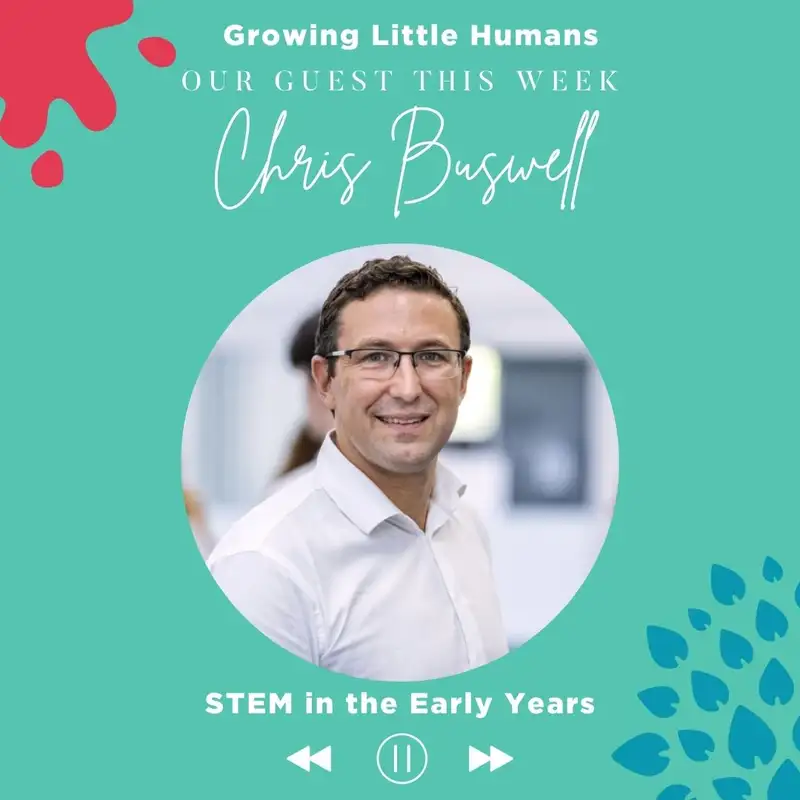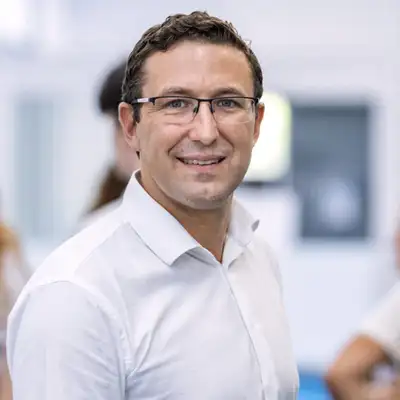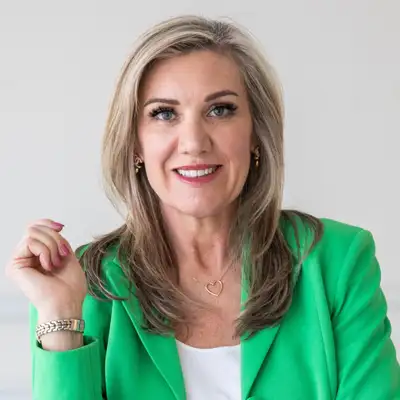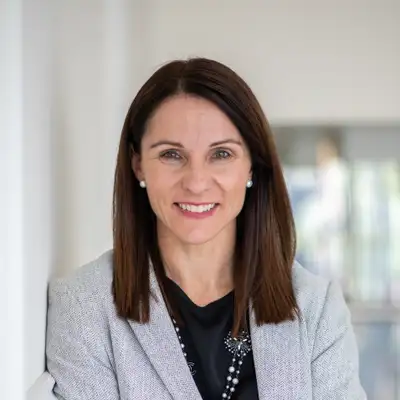
STEM in the Early Years: Sparking Curiosity and Building Skills for the Future
🎙 Transcript
ENGLISH AND ARABIC
STEM in the Early Years
Guest: Chris Buswell
00:00
I'm Melissa. And I'm Lea and we are busy mums, company founders and all round early learning nerds. Welcome to our podcast, Growing Little Humans. Kids aren't born with a user manual, so each week we'll try and cover many topics that you guys encounter and worry about each and every day while you're raising your little humans. On today's episode, we are joined by Chris Buswell, who is the Head of Education at Stempunks.
00:27
with a background in environmental science, education and physics teaching. Chris is a highly regarded teacher in Ed Tech and STEM education. He has played a pivotal role in shaping international learning cultures and establishing educational partnerships across Australia, the UK, the Middle East and Asia Pacific. Chris has won multiple teaching awards and is a recognized expert in strategic STEM education and pedagogical design.
00:55
We're thrilled to have him here today to share his insights and experiences as a global keynote speaker and leader in STEM education. Hi Chris, thank you so much for joining us today. It's great to have you with us. Great to see you guys. Thank you for having me today. So Chris, let's start off. Can you just explain to us what does STEM mean and what are the impacts of exposing our children to a STEM curriculum? Yes, very interesting question. It's something that
01:25
I think has really come to light over the last five, 10 years. We obviously think of STEM as the acronym, Science, Technology, Engineering, Mathematics, but it's far more than that. I think it's an opportunity for us to start thinking of our world, the changing world that our kids are growing up into and how they can start becoming very active problem solvers and identifying challenges that might be in their local environment or their global environment.
01:52
And STEM education allows a pathway for them to be those problem solvers and actually enact change within their world. So, well, I mean, STEM is very different no matter where you go. And whenever I work with schools, whether it be in Australia or overseas, I really try to work with school communities. So within the schools and outside of the schools to really understand what makes STEM for that community. And so we see different iterations of STEM all over the world.
02:21
But there are some core fundamentals that hold it together. And that's that students are being taught how to identify problems using a framework, and then they're getting taught a pathway to really develop human-based skills to solve those problems. Excellent. Thank you so much. And so in the early learning space, so the zero to eight year olds, how do those STEM skills contribute to a child's overall development? Yes, as you guys both know, the time
02:48
that kids are exposed to STEM in that early years is really critical. So the data says that around 6 years of age, students start to form biases towards themselves and their own dispositions and ability within STEM or particular career spaces. They start thinking about gender biases around what type of roles are aligned with gender. And it can really start to shape the way they perceive themselves in the world.
03:17
You know, we know that STEM encourages really core fundamental skills around creativity, being curious about the world, pathways to solving problems, thinking critically, but also working together. We know that we live in a world where we have access to a large network globally through a digital means. And so we no longer have to have all the skills as individuals. We can work together to be able to solve problems. So in terms of
03:46
early learning. I mean, I love the Australian framework, the Early Years Learning Framework where kids get to post construct their learning with their teachers. And so their opportunity for student agency to come into the front of the classroom. So they get to ask questions, they get to think about their world and go, I really would like to learn about this. And so the learning experiences are designed together. And I think that's a fundamental aspect of STEM.
04:13
The opportunity for kids to think about how might I solve this problem and be the ones asking the questions. And those like raw skills at a young age are really critical in the way that students start to develop their own identity, whether that be a STEM identity or whether they begin to see themselves as being capable in a variety of different spaces. But when it comes down to it, it's about giving students,
04:42
young minds an opportunity to have as much opportunity as possible later in life because they've got a broad skill set and they're adaptable, they're resilient and they're able to adapt to any change that may happen in the future. And Chris, I found that really interesting what you're saying about that children are developing their own identities and biases by about the age of 6
05:08
And we're always hearing about how they're trying to encourage girls to be more exposed to STEM. And I guess that information actually shows why it's super important to be exposing children younger to a STEM program. And so what kind of age do you think is a good age to be exposing children to STEM? And because there's lots of ways, isn't there, that you can
05:35
expose children to STEM because as you know Melissa and I at The Wishing Tree we're dealing with the 0 to 5 year age group and Melissa's often telling me you know about STEM things that we can have included in our curriculum that will expose younger children. What are your thoughts around that and what's a good age to be exposing them in some of the early STEM activities? I think it's a fundamental age and I think we're seeing the world change to recognize the real need
06:05
to bring in STEM at that early age. And I think it's about ensuring we understand what it means to bring in STEM. Are we just doing science or are we just doing maths in isolation? STEM is about an interdisciplinary approach to learning. So it's about bringing in a range of skills. We're not just focusing on facts and knowledge. We're developing all sorts of skill sets and using various tools
06:32
and developing, as I mentioned before, those dispositions. So yes, I absolutely believe, like if I think back to when I was young and what might have potentially given me the spark to take my career, I think it was walking around the garden with my grandparents and they just, they would identify things in my environment that would make me curious. And that was a pathway for me to learn more. And so the learning process that I went through was
07:01
okay, so we've got a problem. How are we going to solve it? They definitely didn't give me the answers. They created a pathway for me to find that out myself. And I think that's what happens really well at a very young age group. As students’ progress past that 0 to 5 age group, they start forming those biases, as you mentioned before. And when we talk about the data again, once you hit 12 and 13 years of age, it's a really critical age where students can
07:31
might take one branch in the road or another. And it's very hard to get students to understand their own capabilities at that point. And if they don't take those leaps into certain subjects in school, whether that be in primary and high school, and beyond the schooling environment, start to explore their passions, start to really venture into the world that we have around us, then it can really cause them to potentially not take
08:00
careers later in life. And as we know, 75 or 80 % of the careers that are going to be in the future are going to have some form of STEM as a part of them. So it's really critical. And as we know, we've got a world that is being shaped by Ai right now. We're moving into a very interesting time. So I think bringing in those skills as early as possible and developing human-based skills is really critical.
08:25
I think that's really important that you're saying that early exposure to STEM is really going to lead students and girls to have as well to have more confidence to move into those roles and start to drive that learning from an earlier age rather than think, oh, that's not for me. That's for the boys, the math and the science. And I think also really important that you're saying that it's so interconnected. It's not just a standalone subject being taught. So I think that's really valuable information that parents aren't going to get a
08:53
a STEM comment on their report card per se and question that. So obviously we always had the question about technology. So what role does technology have in developing those early learning STEM skills? Yes, this is a really interesting question. So when I think of tech, I think of tech as a tool. It's something that we can use to solve problems. It can be used really effectively or it can become a crux.
09:22
But as we know, the type of careers are changing quite rapidly in our world and students are able to use technology for a variety of different skill capability developments. So for example, they could use it to collaborate. They could use it as a tool to enhance creativity. You know, they might use it as an opportunity to learn more about the world around them. So I think it's about structuring opportunities, learning opportunities that don't make the tool, the tech
09:51
the focus. It's just a part of the learning experience and they understand it's just one of the tools in their repertoire that they can use to solve those problems. Chris, on the counter argument of that, we're always talking now about too much screen time. So how do you think we find that balance between having too much screen time and hands on learning with STEM? Yes, that's another interesting one. A little caveat.
10:21
I don't have kids myself, so I think as a parent, you may be swayed in your opinion of that question. I think there is a healthy balance there, absolutely. We have a learning pathway that requires tech. I'm sure everyone in the room right now would use tech in their role in some form or another. And it's about students feeling confident and capable using tech, understanding that
10:50
tech is so rapidly changing. And so they need to be adaptable in that environment. And if we don't allow exposure to that, it stops students from being able to be confident and able to be able to adapt to that changing world. Once again, screen time, if I was a parent, I would see the impact that it would have from a perspective around behavior. The people that I work for at STEM punks,
11:18
I know when I go to their house to maybe have a coffee and I go, well, it's very quiet here. I know you've got three kids. It's because they're on their screen. So it completely changes the dynamic of the environment. So I think it's really important that we just educate both kids and adults who are using tech, that it's just a part of the learning pathway. And there are opportunities using the tech to develop skills, but it's also critical
11:47
to explore the world that we live in in other ways as well. So it sounds like we really just have to foster that curiosity in children and have an early introduction. And I think just these conversations around awareness about what is STEM and how can we as parents and educators be ensuring that it's included in children's lives from an early age.
12:11
Great, well, thank you so much for joining us today. Lots to think about. I'm sure I'm going to have lots of questions after this podcast. So parents and viewers can get in contact with you or share your contact details in the show notes. And thank you so much for joining us today. And Chris, as a last message, do you recommend any resources to parents that might give them more STEM awareness? Yes, I mean,
12:40
there's a variety of different resources online. I mean, I would recommend that if parents are really interested in learning more about STEM, jump online. There is obviously a variety of different programs that would structure learning. Like if we wanted to obviously build skills in computational thinking, for example, there's some fantastic programs online like Scrap Junior or Codable that will build skills,
13:07
students skills in critical thinking regarding language and coding. One thing that I really love is Minecraft. So we use it a lot in our work at STEMpunks and students have great capability in it from a very young age. When I was working at the Australian International School in Dubai, I had the 3 and 4 year olds building future cities in Minecraft. So it's an opportunity for them to use a variety of materials, animate and create scenes that
13:36
they can then pitch and share to the class. And so it creates something that's tangible for them to be able to showcase. So STEM is such a diverse field. It's about getting hands on. It's about learning skills in construction at a young age. It's about integrated tech, but it's also about creating communities. So I think
14:02
if we're in the Saudi Arabian market, I would encourage any parent out there to look for other eager parents that are working in this space or have an interest and work together to create communities. And it's by creating these ecosystems and these networks that we get really, really strong STEM communities. Thank you so much, Chris. We'll share all those resources in our show notes and people can reach out to you at STEMpunks if they want to.
14:29
Thank you so much for joining us today and we hope that everyone's got something out of our conversation about STEM. Thank you very much and all the best for the podcast. Thank you. And here come the Legals. Our podcast is purely brought to you for educational and entertainment purposes. We are just two hectic mums and we are certainly not licensed therapists. This podcast is not intended as a substitute for the advice of licensed or qualified professionals. And if you do need some help
14:57
please seek out some professional advice.
الترجمة باللغة العربية
STEM في السنوات المبكرة
00:00
أنا ميليسا. وأنا ليا، ونحن أمهات مشغولات، مؤسستا شركات ومهووسات بالتعليم المبكر. مرحبًا بكم في بودكاست "Growing Little Humans". الأطفال لا يولدون مع دليل مستخدم، لذا في كل حلقة، سنحاول تغطية العديد من المواضيع التي تواجهونها وتقلقون بشأنها كل يوم أثناء تربية أطفالكم. في حلقة اليوم، ينضم إلينا كريس باسوِل، رئيس قسم التعليم في Stempunks.
00:27
مع خلفية في العلوم البيئية، والتعليم و تدريس الفيزياء، يُعتبر كريس معلمًا مرموقًا في تكنولوجيا التعليم والتعليم في مجالات STEM. لقد لعب دورًا محوريًا في تشكيل ثقافات التعلم الدولية وتأسيس الشراكات التعليمية عبر أستراليا والمملكة المتحدة والشرق الأوسط وآسيا والمحيط الهادئ. فاز كريس بالعديد من جوائز التدريس ويُعتبر خبيرًا معترفًا به في التعليم الاستراتيجي في STEM وتصميم التعليم.
00:55
نحن متحمسون لاستضافته اليوم ليتشارك معنا رؤاه وتجاربَه كمتحدث رئيسي عالمي وقائد في مجال التعليم في STEM. مرحبًا كريس، شكرًا جزيلاً لانضمامك إلينا اليوم. إنه لشرف لنا أن تكون معنا.
كريس:
مرحبًا، سعيد بلقائكم. شكرًا على استضافتي اليوم.
ليا:
لنبدأ إذًا. هل يمكنك أن تشرح لنا ما هو معنى STEM وما هي تأثيرات التعرف على STEM بالنسبة لأطفالنا؟
كريس:
سؤال مثير للاهتمام. هذا شيء بدأ يبرز بشكل واضح في السنوات الخمس أو العشر الماضية. عادة ما نفكر في STEM كاختصار للعلوم والتكنولوجيا والهندسة والرياضيات، لكن الأمر أكثر من ذلك بكثير. أعتقد أنه فرصة لنا لبدء التفكير في عالمنا، في العالم المتغير الذي ينمو فيه أطفالنا، وكيف يمكنهم أن يصبحوا حلّالين نشطين للمشاكل وأن يتعرفوا على التحديات التي قد تكون في بيئتهم المحلية أو في بيئتهم العالمية.
ليا:
وماذا عن مهارات STEM في مرحلة التعليم المبكر، من 0 إلى 8 سنوات؟ كيف تسهم تلك المهارات في تطوير الطفل بشكل عام؟
كريس:
كما تعرفون، الوقت الذي يتعرض فيه الأطفال لـ STEM في هذه السنوات المبكرة يعد أمرًا بالغ الأهمية. تشير البيانات إلى أنه في حوالي سن 6 سنوات، يبدأ الأطفال في تكوين تحيزات تجاه أنفسهم وقدراتهم في STEM أو المجالات المهنية المحددة.
ليا:
نعم، وهذا يوضح لماذا من المهم جداً أن يتعرض الأطفال لـ STEM في سن مبكرة.
كريس:
بالضبط!
الأنشطة المبكرة في STEM
06:05
أعتقد أن هذه مرحلة أساسية وأعتقد أننا نرى العالم يتغير للاعتراف بالحاجة الحقيقية لإدخال STEM في هذه المرحلة المبكرة. وأعتقد أن الأمر يتعلق بضمان فهمنا لما يعنيه إدخال STEM. هل نحن فقط نقوم بتعليم العلوم أو الرياضيات بمعزل عن بعضهما؟ STEM هو نهج متعدد التخصصات للتعلم. لذا يتعلق الأمر بإدخال مجموعة من المهارات. نحن لا نركز فقط على الحقائق والمعرفة. نحن نطور جميع أنواع المهارات باستخدام أدوات متنوعة.
06:32
ونقوم بتطوير، كما ذكرت سابقًا، تلك الاستعدادات. نعم، أعتقد بالتأكيد، إذا فكرت في الوقت الذي كنت فيه صغيرًا وما قد يكون قد أعطاني الشرارة لتحفيز مسيرتي، أعتقد أنه كان التنقل حول الحديقة مع جديّ، حيث كانوا يحددون أشياء في بيئتي تجعلني فضولياً. وكان ذلك مسارًا لي لأتعلم أكثر. لذا كانت عملية التعلم التي مررت بها هي: "حسنًا، لدينا مشكلة. كيف سنحلها؟" بالتأكيد لم يعطوني الإجابات، بل خلقوا لي مسارًا لأكتشف ذلك بنفسي. وأعتقد أن هذا هو ما يحدث بشكل جيد للغاية في الفئة العمرية الصغيرة جدًا.
07:01
مع تقدم الطلاب بعد هذه المرحلة من 0 إلى 5 سنوات، يبدأون في تكوين تلك التحيزات، كما ذكرت سابقًا. وعندما نتحدث عن البيانات مرة أخرى، بمجرد أن يصل الطلاب إلى 12 و13 سنة، تكون تلك مرحلة حاسمة حيث قد يتخذ الطلاب خيارًا في مسار معين أو آخر. ومن الصعب جدًا على الطلاب فهم قدراتهم في تلك المرحلة. وإذا لم يتخذوا تلك القفزات إلى بعض المواد الدراسية في المدرسة، سواء في المرحلة الابتدائية أو الثانوية، وما بعد بيئة المدرسة، ويبدأون في استكشاف شغفهم، ويبدأون في التفاعل مع العالم من حولهم، فقد يؤدي ذلك إلى عدم اتخاذهم مسارات مهنية لاحقًا في الحياة. وكما نعلم، فإن 75 أو 80٪ من الوظائف المستقبلية ستكون مرتبطة بشكل أو بآخر بـ STEM. لذا، الأمر بالغ الأهمية. وكما نعلم، لدينا عالم يتم تشكيله حاليًا بواسطة الذكاء الاصطناعي. نحن ننتقل إلى وقت مثير جدًا. لذا أعتقد أن إدخال تلك المهارات في أقرب وقت ممكن وتطوير المهارات البشرية أمر بالغ الأهمية.
08:25
أعتقد أن ما تقوله مهم جدًا، بأن التعرض المبكر لـ STEM سيؤدي حقًا إلى أن يحصل الطلاب والفتيات أيضًا على المزيد من الثقة للانتقال إلى تلك الأدوار وبدء دفع تلك التعلم من سن مبكرة بدلاً من التفكير: "لا، هذا ليس لي، هذا مخصص للأولاد، الرياضيات والعلوم." وأعتقد أيضًا أن الأمر مهم جدًا أنك تقول أن هذا مرتبط جدًا ببعضه البعض، وليس مجرد مادة منفصلة يتم تدريسها. لذا أعتقد أن هذه معلومات قيمة حيث أن الآباء لن يحصلوا على "تعليق STEM" في بطاقة تقاريرهم ويرتكبون خطأ في ذلك.
08:53
بالطبع، لدينا دائمًا سؤال عن التكنولوجيا. ما هو دور التكنولوجيا في تطوير تلك المهارات المبكرة في STEM؟
كريس:
نعم، هذا سؤال مثير للاهتمام. عندما أفكر في التكنولوجيا، أعتبرها أداة. إنها شيء يمكننا استخدامه لحل المشكلات. يمكن استخدامها بشكل فعال للغاية أو يمكن أن تصبح عائقًا. ولكن كما نعلم، فإن نوع الوظائف يتغير بسرعة في عالمنا، والطلاب يمكنهم استخدام التكنولوجيا لتطوير مجموعة متنوعة من المهارات. على سبيل المثال، يمكنهم استخدامها للتعاون، يمكنهم استخدامها كأداة لتعزيز الإبداع، يمكنهم استخدامها كفرصة للتعلم أكثر عن العالم من حولهم. لذا أعتقد أن الأمر يتعلق بتشكيل فرص تعليمية لا تجعل الأداة، التكنولوجيا، هي التركيز. إنها فقط جزء من تجربة التعلم وهم يفهمون أنها واحدة من الأدوات في مجموعة مهاراتهم التي يمكنهم استخدامها لحل تلك المشكلات.
09:22
ليا:
كريس، في المقابل، نحن دائمًا نتحدث الآن عن وقت الشاشة الزائد. كيف تعتقد أننا نجد التوازن بين وقت الشاشة الزائد والتعلم العملي في STEM؟
كريس:
نعم، هذا موضوع مثير أيضًا. تنبيه صغير: ليس لدي أطفال بنفسي، لذا أعتقد أنني قد أكون متحيزًا في رأيي عن هذا السؤال. أعتقد أن هناك توازنًا صحيًا هنا، بالتأكيد. لدينا مسار تعليمي يتطلب التكنولوجيا. أنا متأكد أن الجميع في الغرفة الآن يستخدم التكنولوجيا في عملهم بشكل أو بآخر. والأمر يتعلق بأن يشعر الطلاب بالثقة والقدرة على استخدام التكنولوجيا، وفهم أن التكنولوجيا تتغير بسرعة. لذا يحتاجون إلى أن يكونوا قادرين على التكيف مع هذا البيئة المتغيرة. وإذا لم نسمح لهم بالتعرض لها، فإن ذلك يمنعهم من الشعور بالثقة والقدرة على التكيف مع هذا العالم المتغير.
10:50
ليا:
بالطبع، إذا كنت والدًا، سأرى التأثير الذي يمكن أن يحدثه ذلك من منظور سلوكي. الأشخاص الذين أعمل معهم في STEM punks، أعلم عندما أذهب إلى منزلهم لتناول القهوة وأقول، "حسنًا، إنه هادئ جدًا هنا". أعرف أن لديهم ثلاثة أطفال. هذا لأنهم على شاشاتهم. لذا، هذا يغير تمامًا ديناميكيات البيئة. أعتقد أن الأمر مهم جدًا أننا فقط نعلم كل من الأطفال والبالغين الذين يستخدمون التكنولوجيا أن هذه مجرد جزء من مسار التعلم. هناك فرص باستخدام التكنولوجيا لتطوير المهارات، لكن من الضروري أيضًا استكشاف العالم الذي نعيش فيه بطرق أخرى أيضًا.
ليا:
إذاً، يبدو أنه علينا حقًا أن نشجع الفضول لدى الأطفال وأن نقدم لهم مقدمة مبكرة. وأعتقد أن هذه المحادثات حول الوعي بما هو STEM وكيف يمكننا، كآباء ومعلمين، التأكد من أنه يتم تضمينه في حياة الأطفال منذ سن مبكرة.
12:11
رائع، شكرًا جزيلاً لانضمامك إلينا اليوم. هناك الكثير للتفكير فيه. أنا متأكدة من أنني سأطرح الكثير من الأسئلة بعد هذا البودكاست. لذا يمكن للآباء والمشاهدين التواصل معك أو مشاركة تفاصيل الاتصال الخاصة بك في ملاحظات الحلقة. وشكرًا جزيلاً على انضمامك إلينا اليوم. وكريس، كرسالة أخيرة، هل توصي بأي موارد للآباء قد تمنحهم مزيدًا من الوعي بـ STEM؟
12:40
نعم، هناك مجموعة متنوعة من الموارد عبر الإنترنت. أود أن أوصي إذا كان الآباء مهتمين حقًا بتعلم المزيد عن STEM، أن يتصفحوا الإنترنت. هناك بالطبع مجموعة متنوعة من البرامج التي تقوم بتشكيل التعلم. مثلًا، إذا أردنا بناء مهارات في التفكير الحاسوبي، على سبيل المثال، هناك بعض البرامج الرائعة عبر الإنترنت مثل "Scrap Junior" أو "Codable" التي تبني مهارات الطلاب في التفكير النقدي فيما يتعلق باللغة والترميز.
13:07
أحد الأشياء التي أحبها حقًا هو "ماينكرافت". نستخدمها كثيرًا في عملنا في STEMpunks، ولدى الطلاب قدرة رائعة عليها منذ سن مبكرة. عندما كنت أعمل في المدرسة الأسترالية الدولية في دبي، كان الأطفال في سن 3 و4 سنوات يبنون مدن المستقبل في "ماينكرافت". لذا فهي فرصة لهم لاستخدام مجموعة متنوعة من المواد، وتحريك وإنشاء مشاهد يمكنهم عرضها على الصف. وبالتالي، تخلق شيئًا ملموسًا لهم ليعرضوه.
13:36
لذلك، STEM هو مجال متنوع جدًا. إنه يتعلق بالتفاعل اليدوي، وتعلم المهارات في البناء منذ سن مبكرة، واستخدام التكنولوجيا المتكاملة، ولكنه أيضًا يتعلق بإنشاء المجتمعات. لذا أعتقد أنه إذا كنا في السوق السعودي، سأشجع أي والد في هذا المجال للبحث عن آباء آخرين متحمسين يعملون في هذا المجال أو لديهم اهتمام به، والعمل معًا لإنشاء مجتمعات. ومن خلال إنشاء هذه الأنظمة البيئية والشبكات، نتمكن من بناء مجتمعات STEM قوية جدًا.
14:02
شكرًا جزيلاً، كريس. سنشارك جميع هذه الموارد في ملاحظات الحلقة، ويمكن للناس التواصل معك في STEMpunks إذا أرادوا.
14:29
شكرًا جزيلاً لانضمامك إلينا اليوم ونأمل أن يكون الجميع قد استفاد من حديثنا عن STEM. شكرًا جزيلاً وأتمنى لك كل التوفيق للبودكاست. شكرًا. والآن، إليكم الشروط القانونية.
بودكاستنا موجه فقط لأغراض تعليمية وترفيهية. نحن مجرد أمهات مشغولات، ولسنا أخصائيين مرخصين. هذا البودكاست ليس بديلاً عن نصائح المحترفين المرخصين أو المؤهلين. وإذا كنت بحاجة إلى مساعدة، يرجى طلب المشورة من محترف مختص.
Creators and Guests


